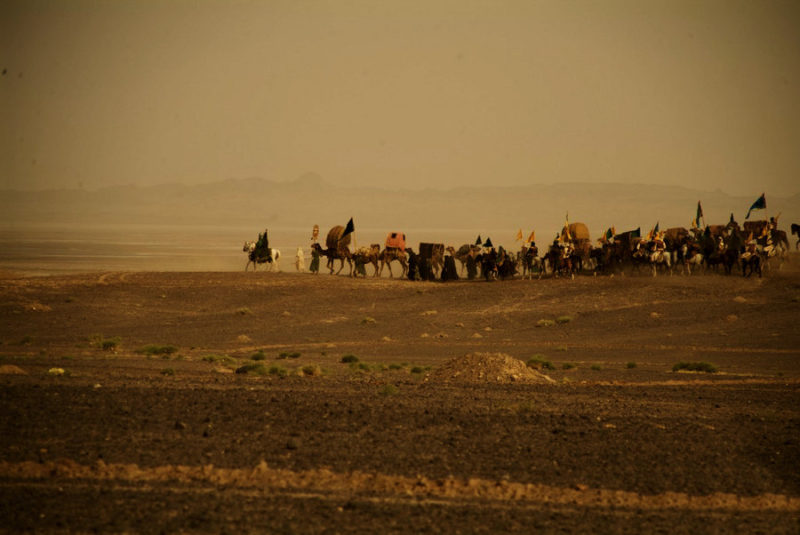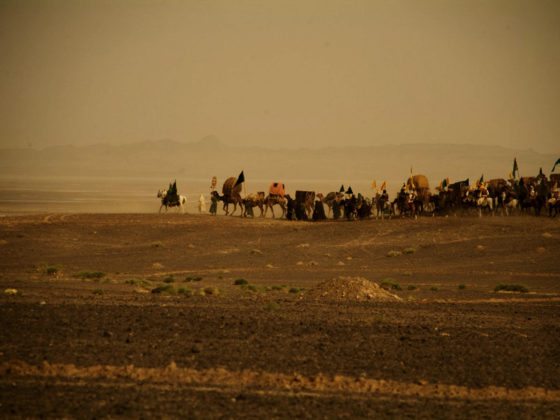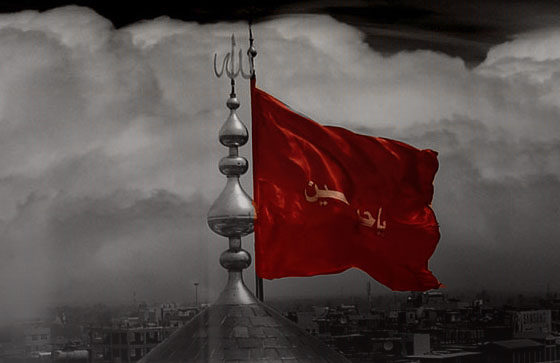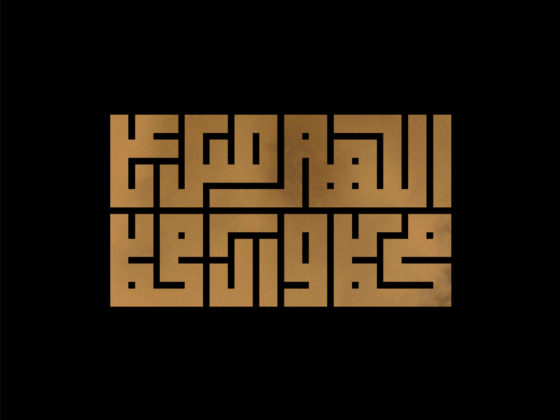In the previous section, we said that the sources provide two versions of Imam Hussein’s (A) letter to the people of Kufa. We have analyzed the first version, which is found in most sources. The second version remains, which is completely different from the first. The only one who provided it is Ibn Asam, in his work entitled “Futuh” (“Book of Conquests”).
Ibn Asam Kufi was a historian who lived during the Abbasid period (he died around 320 AH), the author of the book “Futuh”, which describes in detail the events of Karbala up to the rebellion of Mukhtar. There is disagreement as to whether he was a Sunni or a Shiite. Sunnis usually call him a Shiite and deny his authenticity, while Shiites, on the contrary, consider him a Sunni, based on the fact that he praises Abu Bakr and Umar.
Let us quote once again the text of the letter of Imam Hussein (A), as quoted by Ibn Asam:
“In the name of Allah, the Most Gracious, the Most Merciful! From Hussein ibn Ali to Sulayman ibn Surad, Musayyib ibn Najba, Rifaa ibn Shaddad, Abdullah ibn Wali and the assembly of believers. And then: you know that the Messenger of Allah (S) said in his lifetime: “Whoever sees an unjust ruler who permits what Allah has forbidden, violates His covenant, contradicts the Sunnah of the Messenger of Allah, commits sins and hostility among the slaves of Allah, and does not change his behavior in word or deed – it is on Allah to bring him to the same place as him (subject him to the same punishment).”
You know that those people submitted to the devil and renounced obedience to the Most Merciful. They spread corruption, abolished the prescribed punishments, appropriated the spoils of war, permitted what Allah had forbidden, and prohibited what He had permitted. I am the one who deserves this deed most, because of my closeness to the Messenger of Allah (in the version of Tabari: I am the one who deserves to make a change).
Your letters reached me, and your messengers came to me with your oath of allegiance that you will not betray me or forsake me. If you fulfill your oath of allegiance to me, you will be on the right path. My soul is with your souls, and my family and my children are with your families and children. I am an example for you.
But if you do not do this and break your covenant, throwing off your oath of allegiance to me, then by my life, it will not be unusual for you. You have already done this to my father, my brother, and my cousin Muslim. Is he not deceived who was deceived by you? You have lost your share and lost your purpose. He who breaks (his oath) breaks to his own detriment. Allah has no need of you. And peace be upon you!
A contemporary of Ibn Asam, the Sunni historian Tabari in his book “Tarikh” practically word for word cites the same text, but not in the form of a letter from Imam Hussein (A) to the Kufas, but as his speech before the Hurra detachment, when it blocked his way to Kufa. That is, Tabari claims that Imam Hussein (A) said these same words much later, in the form of a sermon before the Hurra detachment, and not in the form of a letter to the Kufas.
For us, it is not so important where this speech could have been delivered or written (let’s agree to consider it a speech). It will be more important to analyze its content.
We see that the confusion in the sources already puts a question mark over this tradition. It is cited only in Sunni sources – in Ibn Asam and Tabari – and no one cited it before them. There is no indication in the hadiths of Ahl al-Bayt (A) that Imam Hussein (A) made such a speech, and it is not cited in any of the Shiite sources or by any of the Shiite authors (of course, we are talking about ancient authors: later Shiite books, for example, “Bihar” by Sheikh Majlisi, cite it with reference to the same Tabari or Ibn Asam, that is, as a quotation from their works).
But even Sunni authors, such as Ibn Kathir, who usually took it from Tabari, do not cite it.
The most important aspect of this sermon is its opening passage: “The Messenger of Allah (S) said in his lifetime: ‘Whoever sees an unjust ruler who permits what Allah has forbidden, violates His covenant, contradicts the Sunnah of the Messenger of Allah, commits sins and hostility among the slaves of Allah, and does not change his behavior in word or deed, it is on Allah to bring him to the same place as him (subject him to the same punishment).”
For many centuries, this passage was buried under the lines of Tabari, until the rise of Politislamism (political Islam) in the 20th century brought it to the surface as “Imam Hussein’s (A) call to revolt against tyrants.”
In general, it should be borne in mind that the concept of “the revolt of Hussein ibn Ali (A)” was initially exclusively negative and denigrating: as we have said, it was implanted by Yazid and The Umayyads, and later the court historians, defended it in order to absolve themselves of responsibility for the murder of Hussein (A). At that time, no one would have thought of considering it as something positive and heroic. And only in the second half of the 20th century, when the disintegrated Sunni Caliphate was replaced by its ersatz, “poly-Islamism”, this concept was turned upside down and painted in positive colors: Imam Hussein (A) appeared here as a prototype of a “revolutionary”, “fighting against tyrants for the rights of the oppressed” – like the figures of the French Revolution, we seek refuge with Allah from this!
Then some of the traditions of the court historians who professed the “Islam of the majority”, like Tabari, were wiped clean of the dust that had settled on them, which were originally fabricated precisely for the purpose of denigrating Imam Hussein (A) and forgetting his tragedy – and presented to the public with noise and bang, as if Imam Hussein (A) had not said anything else at all!
So Tabari fabricates a hadith from the Messenger of Allah (S), not cited in any other source – Shiite or Sunni – and puts it into the mouth of Imam Hussein (A) in order to bend the same line that pleased those in power, the Umayyads and Abbasids: Hussein ibn Ali (A) is a rebel and a mutineer; he rebelled against the ruler, making a gross mistake and trusting the traitors of Kufa. In doing so, he brought upon himself and his family the necessity of a cruel reprisal, since peace and harmony were more important in the Islamic Ummah. Yazid later repented of what he had done, although he understood that it was impossible to act differently. Perhaps Allah will forgive him, perhaps not, but that is none of our business… All questions are closed, all loose ends are dropped, nothing important has happened, the curtain is drawn…
In this “hadith” or, better to say, tradition, the Messenger of Allah (S) allegedly calls on Muslims to rebel against “unjust rulers”. And although this concerns the most important issue, directly affecting the blood, property and honor of Muslims, a hadith with such a formulation is not found anywhere else except Tabari – neither in Shiite nor in Sunni sources – not in any Muslim book.
Yes, there is a hadith from Said Khudri that the Messenger of Allah (S) said: “The best jihad is the word of truth in the presence of a tyrant.” But this hadith speaks only about one aspect – speaking the truth – whereas what Tabari attributed to Imam Hussein (and the Messenger of Allah) states that it is obligatory for people to change things with words and deeds. However, the hadith about “speaking the truth in the presence of a tyrant” is also Sunni, and as for the words of Ahl al-Bayt (A) and what they taught us during the Occultation, their famous saying can sum up this topic: “Such is my religion and the religion of my fathers.”
So, there is nothing in the Shia sources, or even in the Sunni sources, that would confirm the above-mentioned tradition from Tabari, attributed through Imam Husayn (A) to the Messenger of Allah (S). But if we open the Shia sources, we will see the opposite of this:
Sheikh Kulayni, Tusi and others narrated from Musad ibn Sadaq that Imam Sadiq (A) was asked: “Is calling to what is good and avoiding what is evil obligatory for the entire ummah?” He said: “No.” He was asked: “Why?” He said: “It refers to the strong, the one who is obeyed, and who has knowledge of what is good and evil, and not to the weak who does not know what is what and confuses truth with falsehood. And the proof for this is in the words of Allah: “And let there be among you a group of people who enjoin what is right and forbid what is wrong” (3:104). This applies only to some, not all. As Allah said: “And of the people of Musa there was a community who followed the truth and acted justly thereon” (7:159). He does not say: all the community were like that.”
And Musad asked Imam Sadiq (A): “This is the hadith reported from the Messenger of Allah (S): “The best jihad is speaking the truth in the presence of a tyrant.” What is its meaning?” The Imam (A) said: “This is conditional on the fact that he calls him after he has learned it, and he accepts his words. This does not apply to other cases.” (“Kafi”, vol. 5, p. 59; “Tahzib”, vol. 6, p. 178).
So, Imam Sadiq (A) names two conditions for accepting the hadith about “the word of truth in the presence of a tyrant”:
- The one who calls the ruler to the truth (speaks to him the word of truth) must be aware of him (the ruler or the approved and blamed).
- He must assume that the ruler, for one reason or another, will accept his words.
And if the two named conditions are not met, then this hadith is not valid.
Also, two sheikhs – Kulayni and Tusi – brought in another reliable hadith that Imam Sadiq (A) said: “Verily, the call to “The one who is disobeyed by the ruler is either a believer so that he may learn from it, or an ignorant person so that he may learn. But as for the one who wields the whip and the sword (i.e. the ruler), no.” (Kafi, Vol. 5, Page 61; Tahzib, Vol. 6, Page 178).
Also, Sheikh Kulayni and Sheikh Tusi reported from Mofazzal that Imam Sadiq (A) said: “O Mofazzal! Whoever opposes an unjust ruler and thereby brings calamity upon himself, will not receive a reward for that calamity, and he will not be granted patience in it.” (Kafi, Vol. 5, Page 61; Tahzib, Vol. 6, Page 178).
It was reported from Dawud Raqqa that Imam Sadiq (A) said: “It is not proper for a believer to humiliate himself.” He asked: “How can he humiliate himself? himself?” The Imam (A) replied: “By speaking out against something that he is not capable of (Or: by speaking out against something that is beyond his capabilities).” (“Tahzib” Tusi, Vol. 6, P. 180).
These Hadiths should not be understood in the sense that the Imams of Ahl al-Bayt (A) called for the acceptance of all the actions of unjust rulers and approved of their crimes. On the contrary, there are other Hadiths that call for not praising such rulers, not serving them, not attending their gatherings, etc. (except for some exceptional cases, such as when it is necessary to help the believers or for the sake of taqiyya).
So, the meaning of the Hadiths we have quoted is different: since the entire time from Adam until the advent of Qaim (A) is the time of the rule of Iblis, that is, the kingdom of unjust rulers, then there is no point in speaking out against them, but this is even prohibited, because it will lead to the useless shedding of the blood of Muslims, the destruction of their property and the trampling of their honor. But even if an unjust ruler is overthrown, another one will take his place, but perhaps even worse, since there are no just rulers except the Immaculate Imams established by Allah Almighty, and their kingdom will begin only with the advent of their Qaim (A).
There is also a large group of hadiths from the Immaculate Imams (A) that directly forbid rebellion, for example:
Sheikh Kulayni quotes in Kafi that Imam Sajjad (A) said:
“I swear by Allah, not one of us will rebel before the advent of the Qaim, so that his example will not be like the example of a chick with unformed wings, who fell out of the nest, becoming a toy in the hands of children!” (“Kafi”, vol. 8, p. 341).
From Abu Jaroud that he said to Imam Baqir (A): “Guide me.” The Imam (A) said: “I advise you to be pious before Allah, to sit in your house and not to participate in the gatherings of these people. Beware of those who raise rebellions from among us, for they are on nothing and will not gain anything. And know that the Umayyads have a kingdom that people will not be able to crush, and the people of truth have a kingdom that Allah will give to whomever He wills from among us, Ahl al-Bayt.” (Ghaybah by Numani, p. 102).
At the beginning of Saheefah Sajjadiyya, it is narrated that Imam Sadiq (A) said: “No one has come out and will not come out from among us until the coming of Qaim to remove oppression and establish the truth, otherwise a calamity will strike him, and his rebellion will only add to the misfortunes of us and our Shiites.”
Imam Sadiq (A) said: “Stay in your house, be like a carpet in it and be calm as long as the days and nights are calm. And when news comes to you that Sufyani has come out, rush to us, even if you have to walk on your own feet.” (Wasailu Shia, Vol. 11, Page 36).
It was narrated that Imam Sadiq (A) said to Muhammad ibn Nu’man Ahwal: “O Ibn Nu’man! When there is a state of oppressors, then go and greet those you fear with greetings! Indeed, the one who opposes the state is a murderer of his own soul, plunging it into destruction! Allah says: “And do not throw yourselves with your hands into destruction!” (2:195).” (“Tuhafu al-Uqul,” p. 309).
The Commander of the Faithful, Ali (A) said: “Cover yourselves to the ground and endure calamities! Do not let your hands or your swords move because of the passion of your tongues! Do not rush to that which Allah has not decreed for you! Whoever of you dies in his bed, knowing the rights of his Lord, His Messenger and the People of his House, will die a martyr. His reward is with Allah, and he will be obliged to receive the reward for the good deeds that he only intended to do (but did not do). His intention is as if he had drawn his sword. Verily, everything has its term and period!” (“Wasailu Shia,” p. 11, p. 55).
In “Ghayba” by Numani it is given From Abu Murhif that Imam Sadiq (A) said: “The swift ones will perish.” Abu Murhif asked: “Who are the swift ones?” The Imam (A) said: “The ones who hurry. And the close ones were saved, and the pillars of the fortress were established! Be like the carpets in your houses! Indeed, dust will cover those who raised it! Indeed, they (the oppressors) will not want to cause you harm, unless Allah sends upon them something that will distract them from you – except for those who oppose them.” (Gheiba by Numani, p. 201).
A famous hadith from Imam Sadiq (A) says: “The owner of every banner raised before the advent of Qa’im is a taghut, who is worshipped besides Allah” (Wasailu Shia, Vol. 11, Page 37). The word “banner” in the hadiths of Ahl al-Bayt (A) refers to any political movement.
These were only some examples of hadiths that prohibit rebellion, although there are so many of them that they could be compiled into a separate small book. And in general, the concept of Ahl al-Bayt (A) is that the near world (dunya) is divided into two parts – the kingdom of lies and the kingdom of truth. The first will last from Adam to Qa’im, and the second – from Qa’im to the Day of Judgment. The wisdom of the Almighty, in order to test people, determined that the first group would have power, and the second group would have power. And this is the meaning of the words of the Commander of the Faithful, Ali (A): lil batili jaulya wa lil haqqi daulya – “falsehood has its period, and truth has its kingdom.”
And so tyrants and their regimes are an inevitable part of the equation in this world, and no one can do anything about it until the kingdom of truth comes. Therefore, rebellions are pointless: they only lead to the shedding of the blood of the followers of the Imams (A), but they cannot establish a just government, since Allah, the Most High, for purposes known to Him (testing people), postponed it until the emergence of the Qaim (A). Until he emerges, the Shiites must be like “palaces in their homes”, not revolting, showing patience and waiting for the arrival of their Imam (A). In return, the Almighty promised them that tyrants and oppressors will not harm them, since He will occupy them with each other.
This topic itself is very long, and books and books can be written about it. Therefore, we will limit ourselves to this explanation.
Now let us return to the speech under consideration, which Tabari and Ibn Asam attributed to Imam Hussein (A). Could the Messenger of Allah (S), taking all this into account, not only not prohibit, but also impose on Muslims the duty of resisting the rulers in word and deed, that is, in fact, raising uprisings, as follows from the hadith they invented? This would mean that the Messenger of Allah (S) with his own hands threw Muslims into the furnace of endless misadventures and turmoil, in which their lives, their property and honor will burn, without any chance of changing anything, for until the arrival of Qaim, changes are impossible in this world.
Let us also look at the sira and example of the two Imams before Husayn (A) who were higher than him – his father, the Commander of the Faithful, Ali (A) and his brother, Hasan al-Mujtaba (A). If such a hadith really existed from the Messenger of Allah (S), they certainly must have known it. Then why did they not rebel against the tyrants of their time? Why did Imam Ali (A) tolerate the usurpers of Saqifah for twenty-four years, when, in his own words, “there was a thorn in my eye and a sharp thorn in my throat”? Why did Imam Hasan (A) not leave his house for years before his murder? Finally, why did Imam Husayn (A) himself not rebel against Muawiya, who was worse than Yazid?
Only thirteen days passed from the accession of Yazid to the exit of Imam Husayn (A) from Medina. This was preceded by ten years of his Imamate, which fell during the reign of Muawiya. Why then did he not speak out against Muawiya for ten years, but spoke out against Yazid in the very first days of his reign? After all, the hadith under consideration, by its meaning, makes such a speech obligatory and threatens the one who does not do it with the same fate as the tyrant himself: “Whoever sees an unjust ruler who allows what Allah has forbidden, violates His covenant, contradicts the Sunnah of the Messenger of Allah, commits sins and hostility among the slaves of Allah, and does not change his behavior by word or deed – it will be on Allah to bring him to the same place where he was (subjected to the same punishment).” Likewise, all the Imams (A) after the Commander of Martyrs Husayn (A) – from Ali ibn Husayn Sajjad to Hasan al-Askari (A): none of them rebelled or spoke out against the tyrants of their time, although they had seen with their own eyes their countless crimes, oppression, violation of the Quran and Sunnah, trampling on the laws of Islam, killing the believers, and so on, so that their fingers would break before they could describe and list their evil deeds. Why did they not try to “change their behavior by word or deed,” as this fabricated hadith insists?
Perhaps someone will say that the duty to rise up against the tyrant of his time with arms in hand was entrusted only to Imam Husayn (A), and not to the rest of the Imams (A). However, such an assertion requires proof. On what is it based? Are not all the Imams entrusted with the same duties? Are they not all one and the same light? But if we look at this hadith, then from its literal meaning it is clear that it concerns all believers in general, and not only the Immaculate Imams (A), and does not imply any exceptions.
So, we consider the hadith under consideration to be rejected and fabricated, for the following reasons:
- The content of this tradition contradicts hundreds and hundreds of reliable and generally accepted hadiths about taqiyya, the value of the life of a believer, the prohibition of rebellion, the conditions for calling to what is approved and distancing oneself from what is reprehensible, as well as the sira of the Incorruptible (A) – it contradicts literally everything that we know about religion.
- It was cited only by Sunni authors Ibn Asam and Tabari, and most likely one of them took it from the other – in order to impose the interpretation of the events of Karbala that was beneficial to those in power.
- Not a single Shiite source cited it, but Sunni sources of hadith do not cite it either (apart from these two historical books). Sunnis also consider this hadith to be fabricated and attributed to the Messenger of Allah (S).




